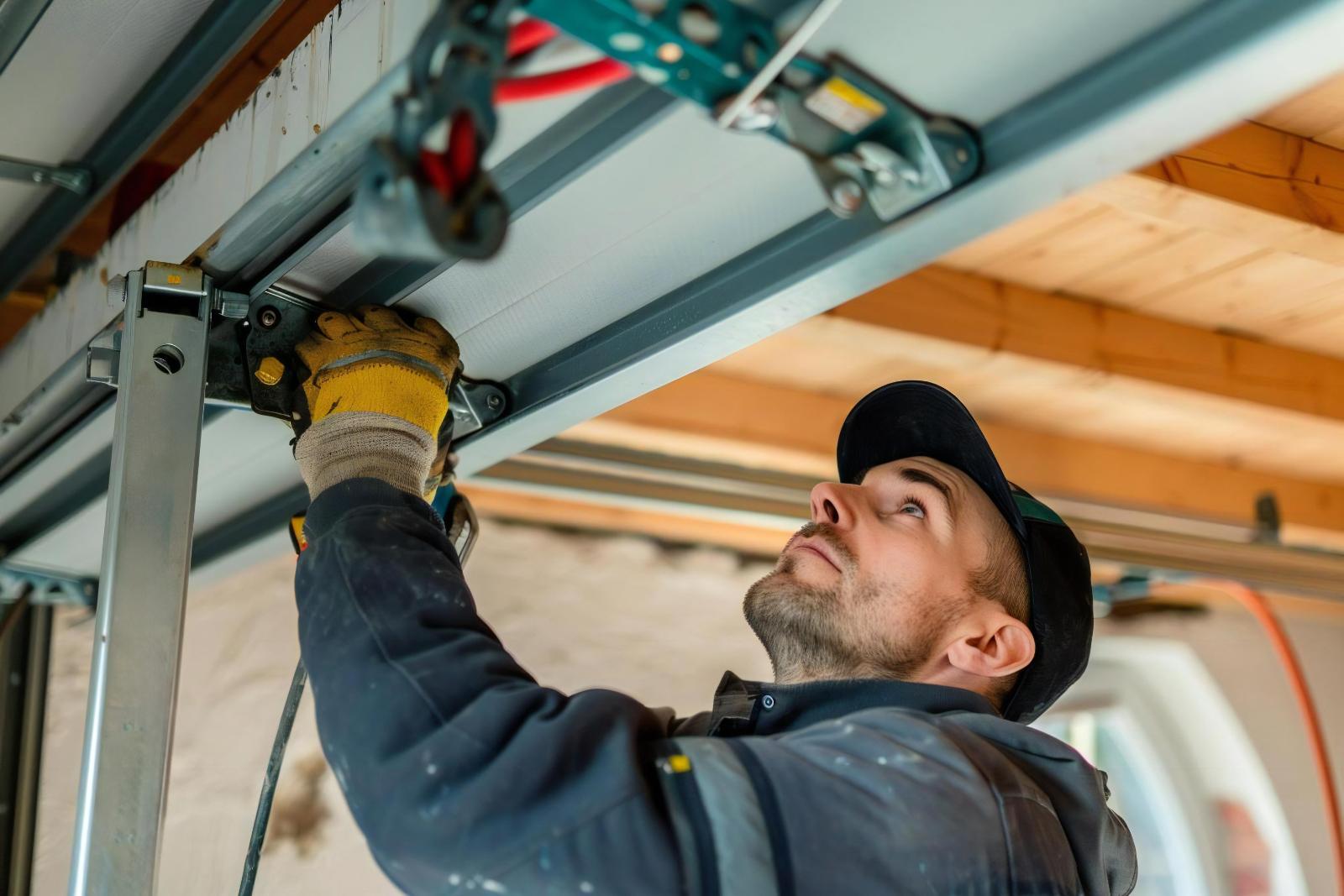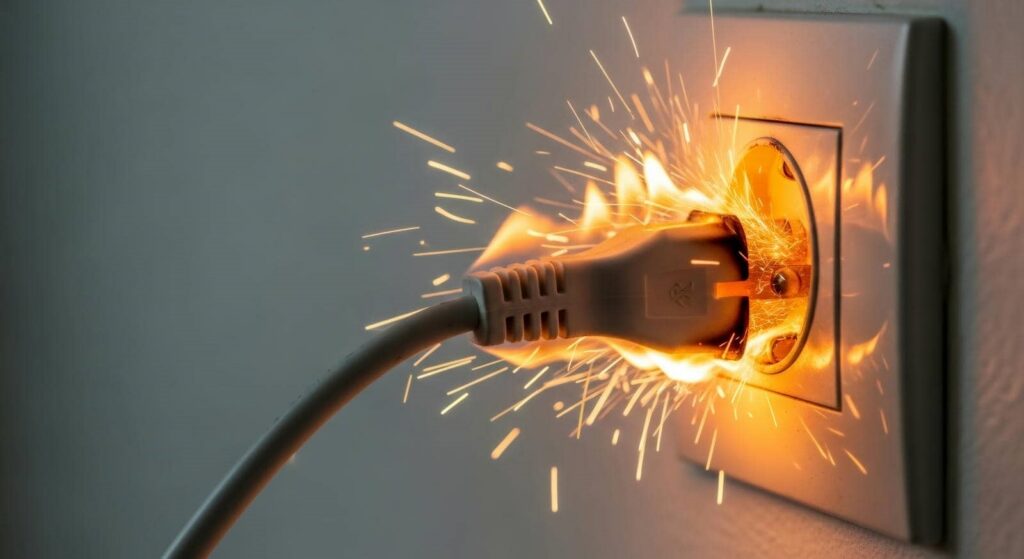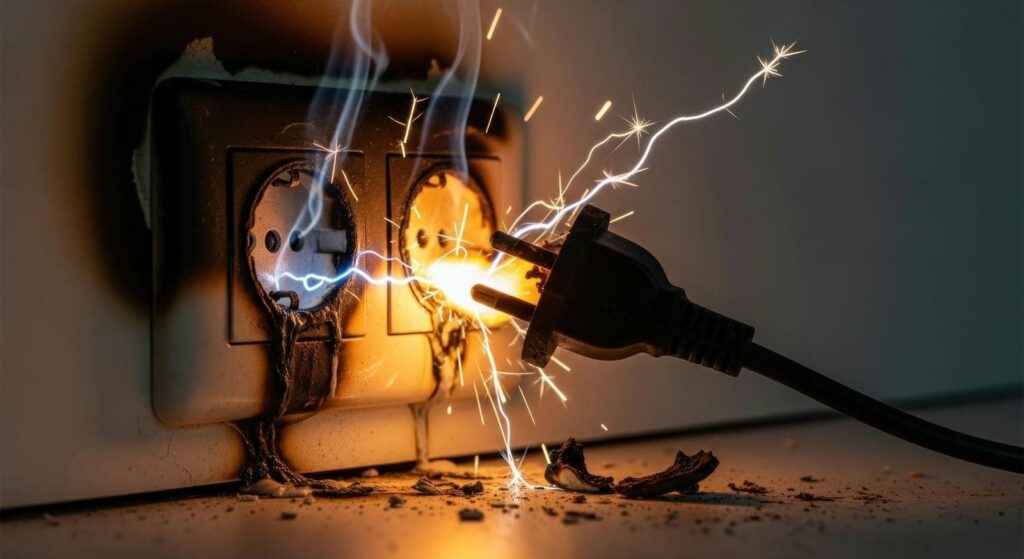Contents
When it comes to handling garage door repairs on your own, having a solid grasp of the essential strategies can save you time and money in the long run. By understanding the foundational steps involved, you can confidently navigate through common issues and perform basic maintenance tasks with ease. However, knowing when to draw the line between a DIY fix and seeking professional assistance is pivotal for ensuring the safety and functionality of your garage door. So, let’s explore how you can arm yourself with the top DIY garage door repair strategies and make informed decisions for your home’s security and convenience.
Key Takeaways
- Prioritize safety gear like gloves and goggles.
- Assess door operation for unusual sounds or movements.
- Check for wear on springs, cables, and tracks.
- Lubricate hinges and rollers with penetrating oil.
- Tighten loose screws and bolts for proper function.
Safety Precautions
Before attempting any DIY garage door repair, it’s important to prioritize safety precautions to avoid potential hazards and injuries. Safety gear plays a critical role in ensuring your well-being during the repair process. Always remember to wear protective equipment such as gloves, safety goggles, and sturdy shoes to shield yourself from any accidents. Additionally, it’s essential to have a first aid kit nearby in case of minor injuries.
Familiarize yourself with emergency procedures before starting any repair work on your garage door. Make sure you know how to disconnect the door from the automatic opener and how to operate the door manually in case of a power outage or malfunction. Understanding these steps can prevent accidents and keep you safe throughout the repair process.
Furthermore, children and pets should always be kept away from the work area to avoid any potential dangers. Clear the surroundings of any unnecessary clutter or obstacles that could pose a risk during the repair. By creating a safe environment and following proper safety protocols, you can greatly reduce the likelihood of accidents and injuries while working on your garage door. Remember, your safety should always be the top priority.
Tools Needed
Prepare the necessary tools required for DIY garage door repair, including a socket wrench set, screwdrivers, pliers, and a ladder. Proper tool organization is crucial for a successful repair. Having a designated toolbox or storage area for your garage door repair tools guarantees you can easily locate what you need when the time comes. It also helps maintain the tools in good condition and prevents misplacement.
When starting a DIY garage door repair project, having the right tools readily available is vital. The table below outlines some of the essential tools you’ll need for common garage door repairs:
| Tools | Description | Common Uses |
|---|---|---|
| Socket Wrench Set | Various socket sizes included | Tightening nuts and bolts |
| Screwdrivers | Flathead and Phillips heads | Removing screws |
| Pliers | Different types available | Gripping and bending objects |
In addition to these basic tools, consider investing in a DIY repair kit specifically designed for garage doors. These kits often include items like replacement rollers, hinges, and cables, providing you with everything you need to address common garage door issues efficiently. By having a well-organized set of tools and access to DIY repair kits, you’ll be better equipped to handle any garage door repair task that comes your way.
Assessing the Problem
To effectively address any garage door repair task, start by thoroughly evaluating the specific problem at hand. DIY troubleshooting begins with a detailed inspection of the garage door’s operation. Listen for any unusual sounds when the door opens or closes, such as grinding, squeaking, or scraping noises. Observe if the door moves unevenly or jerks during operation, as these could indicate issues with the tracks, rollers, or springs.
Next, a visual inspection of the garage door and its components will be conducted. Look for any visible damages, dents, or misalignments on the panels. Check the springs for signs of wear or breakage, and inspect the cables for fraying or slack. Additionally, examine the tracks to make certain they’re properly aligned and free from debris that could obstruct the door’s movement.
Problem diagnosis involves testing the functionality of the garage door opener. Make sure the opener responds to commands from the remote or wall switch. If the opener fails to operate the door, it could indicate electrical issues or a faulty motor.
Common Garage Door Issues
Evaluating the garage door for common issues will help you pinpoint the root cause of any operational problems and determine the necessary repair steps. By understanding these common garage door issues and implementing DIY solutions, you can save time and money while ensuring your garage door functions smoothly.
Here are some troubleshooting tips for common garage door issues:
| Issue | Possible Cause | DIY Solution |
|---|---|---|
| Uneven Closing | Misaligned track | Check alignment and tighten bolts |
| Noisy Operation | Lack of lubrication | Apply lubricant to hinges and rollers |
| Door Reversal | Malfunctioning sensors | Clean sensors or adjust settings |
| Remote Control Failure | Dead batteries | Replace batteries in the remote |
| Slow Response | Worn-out springs | Replace springs for smoother operation |
Step-by-Step Repair Instructions
Begin your garage door repair process by carefully examining the condition of the hinges and rollers to identify any signs of wear or damage. If you notice any rust, bending, or looseness, it’s crucial to address these issues promptly. First, use penetrating oil to lubricate the hinges and rollers, which can often resolve minor problems. Additionally, tighten any loose screws or bolts that may be causing the components to function improperly.
When it comes to troubleshooting the functionality of your garage door, check the tracks for any debris or obstructions that could be impeding smooth operation. Clear out any dirt, rocks, or other objects that may have accumulated in the tracks, affecting the door’s movement. Ensure the tracks are aligned properly and adjust them if necessary to prevent the door from getting stuck during opening or closing.
For common issues like a noisy garage door, applying silicone-based lubricant to the rollers, hinges, and springs can greatly reduce the noise levels.
Regular maintenance tricks such as cleaning the tracks and applying lubrication can prevent wear and tear on the components, extending the lifespan of your garage door.
Maintaining Your Garage Door
Regular maintenance is crucial for guaranteeing your garage door’s best performance and longevity. By investing time in preventive maintenance, you can save money in the long run by avoiding costly repairs.
Here are some cost-effective solutions and seasonal upkeep tips to keep your garage door functioning smoothly:
Lubricate Moving Parts: Regularly lubricating the moving parts of your garage door, such as hinges, rollers, and springs, can prevent wear and tear. Use a silicone-based lubricant for best results.
Inspect Weather Stripping: Check the weather stripping along the bottom of the garage door to make sure it’s intact and providing a proper seal. Replace any damaged weather stripping to keep out drafts and pests.
Tighten Hardware: Periodically check and tighten the hardware, including bolts and screws, on your garage door. Loose hardware can cause the door to become misaligned and lead to operational issues.
Clean Tracks and Rollers: Dirt and debris can accumulate in the tracks and on the rollers, affecting the smooth operation of the door. Regularly clean these components with a damp cloth to prevent friction and jams.
When to Call a Professional
Knowing when to call a professional is essential for the longevity and safety of your garage door.
Professional assessments offer the benefit of expert insight and specialized knowledge to address complex issues effectively.
Recognizing warning signs early on guarantees that safety concerns are a top priority and are promptly addressed by a professional.
Professional Assessment Benefits
Consider contacting a professional for a garage door assessment if you notice any unusual sounds, erratic movements, or difficulty in operation. When it comes to ensuring your garage door’s safety and functionality, a professional’s expertise can make a significant difference.
Here are some benefits of seeking a professional assessment:
Accurate Diagnosis: A professional can accurately identify the root cause of any issues, ensuring that the right solutions are implemented.
Prevent Further Damage: Early detection of problems during an assessment can prevent minor issues from escalating into major and costly repairs.
Ensure Safety: Professionals are trained to assess potential safety hazards in garage door systems, keeping you and your family safe.
Long-Term Cost Savings: By addressing problems promptly and correctly, you can avoid expensive repairs down the line, saving you money in the long term.
Warning Signs Recognize
If you notice any of the following warning signs with your garage door, it is advisable to seek professional assistance promptly. Ignoring these signs could lead to more significant issues and higher repair costs in the long run. While DIY tutorials can be helpful for some garage door repairs, certain warning signs indicate the need for a professional touch. Consider the following signs that warrant calling in a professional:
| Warning Signs | Description |
|---|---|
| Unusual Noises | Grinding, scraping, or popping sounds can indicate a serious issue with the door mechanisms. |
| Door Off-Track | If the door is misaligned or not running smoothly on its tracks, it may require professional realignment. |
| Slow Response | A delay in the door’s response to opening or closing commands may signal underlying problems. |
| Visible Damage | Cracks, dents, or significant wear and tear on the door panels should be inspected by a professional. |
For these warning signs, it’s essential to prioritize safety and avoid attempting repairs beyond your expertise. Seeking professional help can prevent accidents, further damage, and potentially higher repair costs.
Safety Concerns Priority
To safeguard your safety and prevent further damage to your garage door, promptly calling a professional becomes imperative when encountering warning signs like unusual noises, a door off-track, slow response, or visible damage.
Safety Equipment:
Professionals come equipped with the necessary safety gear to handle repairs efficiently and safely. They have the knowledge to use this equipment effectively, minimizing any potential risks to you.Repair Risks:
Attempting complex repairs without proper expertise and training can lead to accidents or exacerbate existing issues. Professionals are trained to navigate these risks and ensure a successful repair process.Expertise:
Professionals have the experience and skills to accurately diagnose the problem with your garage door. Their expertise allows for precise repairs, reducing the likelihood of further complications.Long-term Solutions:
Calling a professional ensures that the root cause of the issue is addressed, providing long-term solutions that prevent recurring problems. This approach not only saves you time and money but also safeguards the safety and functionality of your garage door.
Final Thoughts
Tackling DIY garage door repairs can be a rewarding experience for homeowners. By prioritizing safety, having the right tools, and following step-by-step instructions, you can successfully address common issues.
While some may hesitate due to concerns about complexity, remember that seeking professional help for complex problems is always an option.
With the right approach and attention to detail, you can keep your garage door functioning smoothly and safely.




